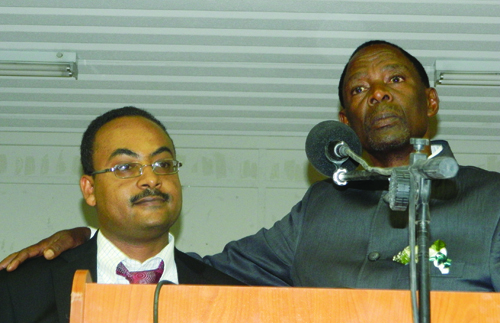ETHIOPIAN Health Minister Kesetebirhan Admasu and his Namibian counterpart Richard Kamwi met about 500 community health extension workers from five different regions at Eenhana in Ohangwena region last Thursday and told them about the importance of their work and what is expected of them.
ETHIOPIAN Health Minister Kesetebirhan Admasu and his Namibian counterpart Richard Kamwi met about 500 community health extension workers from five different regions at Eenhana in Ohangwena region last Thursday and told them about the importance of their work and what is expected of them.
Admasu and Kamwi visited the region after signing a memorandum of understanding (MoU) for the training of Namibian medical health professionals.
The Ethiopian minister said both countries are faced with similar health challenges although Ethiopia was one of the countries with the highest number of deaths on the whole continent.
“We have had the worst maternal deaths in Africa and many challenges before the programme, but we managed to convince and mobilise the entire community because without their involvement, you cannot achieve what you want,” said Admasu.
He also said Ethiopia has improved its health sector significantly way ahead of the Millennium Development Goals target, bringing the maternal death rate down to 50%.
Extension workers, Admasu said, need to create awareness to fight and reduce diseases like malaria and maternal deaths.
He encouraged the workers to be loyal and dedicated members of the health sector, with the plight of their patients.
The Unicef acting Country Representative, Marcus Betts, expressed the same sentiments saying the skills acquired by extension workers will ensure children and mothers, especially those in remote areas, the poorest and the most vulnerable are reached with essential information and quality services.
“We believe that with strong collaboration and support from the ministry of health in Ethiopia, we can scale up the health extension worker programme nationally to accelerate child survival in Namibia,” said Betts.
He also said development partners such as Unicef, WHO and USAID have recognised the enormous challenges Namibia faces in reaching populations in remote areas considering a very dispersed population, long distances and difficult terrain in the country.
Betts added that Unicef will continue finding better ways of linking the programme with other community-based volunteers to reach the common goal of improved maternal and child health.
Kamwi urged the workers to work hard and be able to connect with those that are within the health centres’ reach, before warning the regional councillors against nepotism and discrimination.
Stay informed with The Namibian – your source for credible journalism. Get in-depth reporting and opinions for
only N$85 a month. Invest in journalism, invest in democracy –
Subscribe Now!






